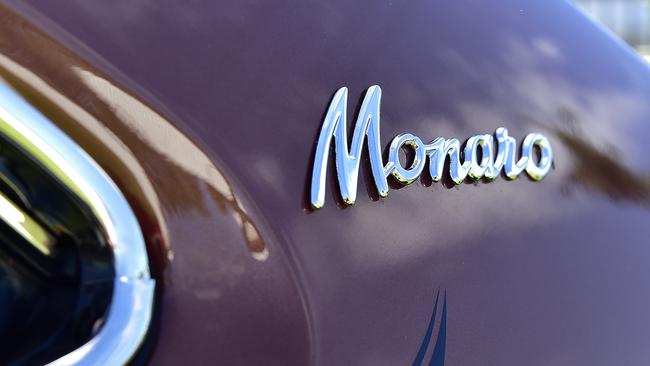A WA investment scheme has been wound up with $240m allegedly outstanding
Chris Marco’s WA investment business will be wound up, owing an estimated $240m.
The 1971 Holden Monaro GTS HQ Coupe is a fine automobile, if you’re into that sort of thing.
The definitive Australian muscle car, it’s become quite the collector’s item, commanding prices in the mid-$100,000 range.
So too the 1972 Chrysler Charger VH E49, which can change hands for as much as a quarter of a million, or even the 1975 Datsun 260z coupe, which could set you back as much as $65,000.
The total value of these cars, and another six owned by West Australian man Chris Marco, his son Damon, and his company AMS Holdings (WA), would add up to a reasonable sum.
Combine it with residential and commercial property interests and the figure is hitting the mid $20 million or so.
Even so, it’s a drop in the bucket compared with the “at least” $240m Marco and AMS are suspected to owe as many as 132 investors, in what The Federal Court, and ASIC have described as an “unregistered managed investment scheme’’, which is now in the hands of liquidators.
An ASIC announcement, released in early December, arguably underplayed what has been a long-running process to shut down Marco’s “investment” activities and return what funds were still in existence to creditors.
The corporate regulator had, it said “succeed(ed) in application to wind up Chris Marco’s unregistered managed investment scheme’’ and said he had been “permanently restrained from carrying on a financial services business without an Australian Financial Services (AFS) licence’’.
What was not mentioned, was that creditors, ranging from so-called “mum and dad” investors up to more sophisticated types, were allegedly owed probably around a quarter of a billion dollars, but perhaps as much as $380m.
For his part, Marco told The Australian that it was ASIC’s intervention itself which derailed an investment process which he’d been running successfully for nearing 20 years, and legal actions including two potential class actions were in the offing.
ASIC’s investigations into Marco and AMS are ongoing, but the Federal Court judgment handed down this month and other court documents, paint a picture of investors being sold the promise of “fantastic” returns, with no risk.
Some of these investors, the court documents state, “are ‘Mum and Dad’ type investors who have potentially lost the majority of their retirement assets while others are more sophisticated’’.
The Australian is not suggesting the allegations are true, only that ASIC has made them.
ASIC relied on the affidavits of four investors in making its case.
They were:
• a 69 year old self-employed homoeopath
• a 65 year old check-out operator and former teacher
• a 67 year old council compliance officer, and
• a 53-year-old cafe and restaurant owner
A judgment in a separate case sets out the investment proposal which was offered to that plaintiff, Baxter Global Investments, starting from 2011.
“Mr Marco’s business is described by his evidence as trading in bank instruments as a private investor,’’ the court documents state.
“The bank instruments that Mr Marco trades through are known as private placement programs (PPP). To trade through a PPP, Mr Marco requires capital as ‘proof of funds’ in order to trigger a line of credit enabling him to facilitate arbitrage transactions involving bank instruments in the US and Europe. The proof of funds capital are held and retained by Mr Marco in bank account (sic) in Australia when a PPP trade is in place.’’
Marco, court documents state, would have clients execute a “Declaration of Trust with Mr Marco by which he guaranteed very attractive returns on maturity of the investment’’.
In the Baxter case, the judgment states that the company’s owner Andrew Batchelar was promised a “fantastic return on capital with minimum capital investment’’.
An email from Marco cited as evidence indicated the investments were risk-free.
“There is no risk of losing the principal investments,’’ the email stated.
“The principal investment remains blocked for a specific period in the investor’s bank, ownership of the account remains with the investor, and the funds blocked will not be moved, transferred or withdrawn during the period of blocking as specified. There are no upfront fees, no lien and no mortgage on the client’s asset. Client’s asset remain free of any encumbrances at all times.’’
Baxter’s claim, for $2.45m in principal funds and another $220,263 in accrued interest was upheld by the court.
Whether those funds will be paid remains to be seen.
Marco himself backs up what the Federal Court judgment has outlined in broad strokes in terms of the operations of the scheme, but says it’s a very sophisticated investment process, based on arbitrage trading in instruments such as bonds.
He told The Australian the only finding which had been made against him was that he didn’t have an Australian Financial Services Licence, and scoffed at the idea that he was running a Ponzi scheme - the name given to schemes where existing investors are paid supposed returns with funds supplied by new investors.
He says there are indeed PPP investment schemes which are scams, but his was legitimate, and ASIC is on the hook for losses incurred by investors.
Marco said the figures in the Federal Court judgment were “not even close to being true’’.
“I’ve been tipped upside down for two years in terms of investigation,’’ he said.
“I’ve had over $15m spent on me in terms of being investigated and the only thing the Federal Court has found is that I don’t have a financial services licence, something that I told ASIC 18 years ago ... they’ve always known.
“There’s no funds outstanding at all.’’

Marco said over the years he’d paid investors back about $218m and the only money currently owed were funds rolled over by investors who had not cashed out.
“Those rollovers may amount to that amount of money which you’ve projected, but ASIC has stopped me from earning that money,’’ Marco said.
A major contract worth $200m or so, and potentially much more over time, was thwarted when ASIC intervened in late 2018, he said.
“I lost the contract. The return on that contract was over 200 million euro. I have that documented. Since then five other programs would have come in which would have been over a billion dollars in funds’’.
Marco said ASIC does not understand “debt instrument trading” despite his efforts to explain it to them.
“At the end of the day, our so called corporate regulator, has caused enormous disruption to people, has lost them an inordinate amount of funds, and there’s not one investor prior to ASIC getting involved, who’d ever complained, who’d never been paid.’’
Marco said the scheme worked by pooling investors funds, he says about $40m at the time ASIC intervened, which were used as security for traders to trade derivatives, sometimes at highly leveraged rates.
“They’ve said I’m running a Ponzi scheme, I’m running this, I’m running that. There’s absolutely no evidence of anything of that nature. It’s a legitimate business and always was a legitimate business,’’ he said.
What happened to the bulk of the funds “invested” with Marco has not yet been determined, or is at least not set out in court documents.
But there is at least some indication about what part of the money was spent on.
Vintage cars figure heavily, with a strong predilection towards Holdens.
As well as the aforementioned muscle cars, assets which will be sold off to repay investors include a 1972 Holden Torana “Bathurst”, a 2017 Holden “Maloo” ute, and an outlier - a Ford Falcon XY GTHO Phase III (1971).
A pristine example of the latter set an Australian auction record when it sold for $1.03m in 2018.
As well as the cars, “the Interim Receivers’ analysis of the sources and uses of funds disclosed that ‘$18.4 million has been used to purchase, renovate or maintain property either directly by Mr Marco or indirectly by advancing funds to AMS or related parties’’’.
The December Cout judgment lists 11 properties as well as other property interests held by Marco, to be sold off by the liquidators.
Property records indicate Mr Marco owns a home in the Perth suburb of Mount Hawthorn, which his businesses are registered to.
For the time being, his investment days are over.
But Marco says he is considering his legal options.
“My lawyers are looking at that at the moment. There are already two class actions that are, let’s just say, advanced.
“And I will look at whatever options are available to me.’’
ASIC has been contacted for comment.



